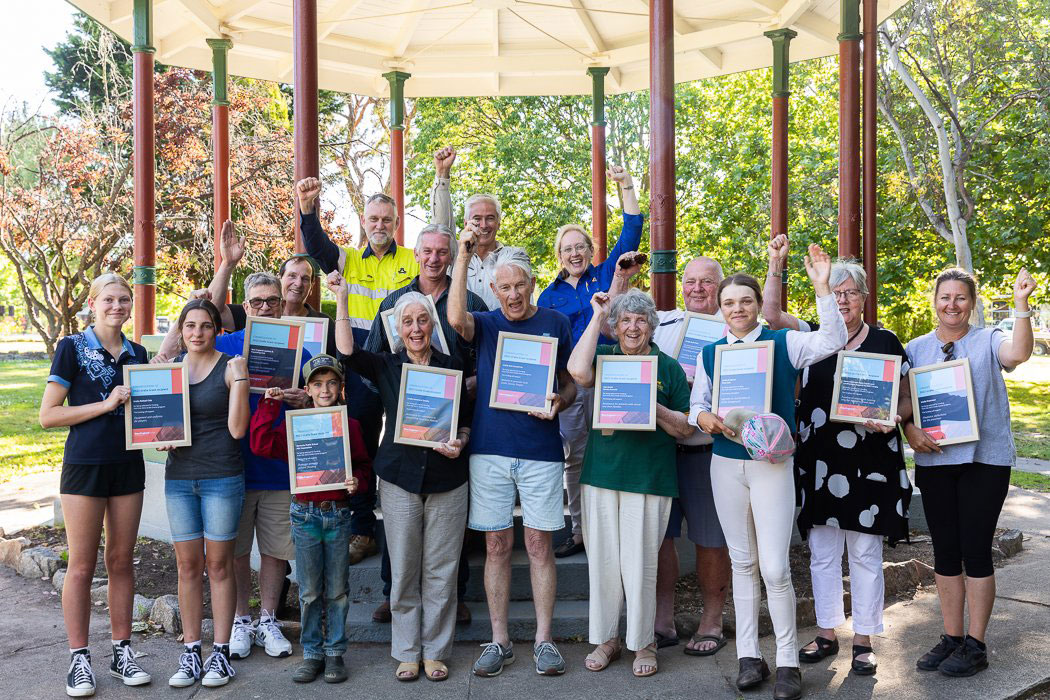-
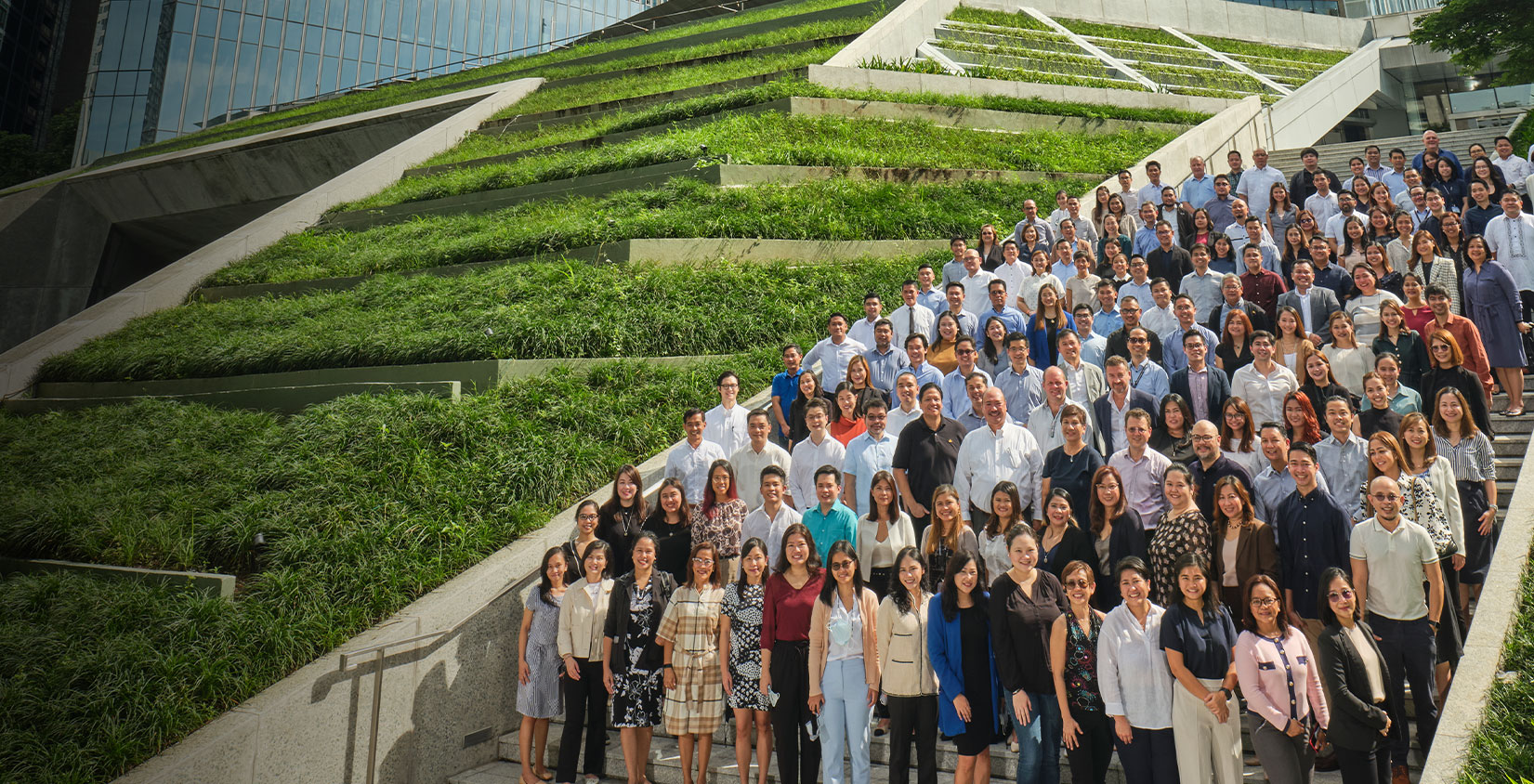
Socialinvestments
Home » Sustainability » ESG-old » Social-old » Social investments-old
Home » Sustainability » ESG-old » Social-old » Social investments-old
In San Marcelino, Zambales, where ACEN is currently constructing its biggest solar farm to date on ~500 hectares of unutilized land covered by lahar, we built large-scale infrastructure developments including a 14-kilometer power transmission line, almost three kilometers of access road and two concrete bridges, significantly improving accessibility for the Indigenous Peoples living near our project sites.
Our wind farms, NorthWind in the Philippines, and Sidrap Wind in Indonesia, have invested close to ₱2 million to concretize community roads, improving accessibility for our host communities.
We also invested over ₱4 million on solar street lights and lamps, solar hybrid system, and our newly launched Renewable Energy Advocacy Program (REAP). Our first activity under REAP was spearheaded by MonteSol at Cubay Elementary School in La Carlota City, where we emphasized the importance of clean energy and sustainability.
In Negros Occidental, IslaSol donated 15kW of solar roofing to La Carlota City’s public market, benefitting more than 250 local visitors per day and helping the local government save approximately ₱240,000 on electricity costs annually. We also funded the installation of solar-powered streetlights in four communities across Zambales and Ilocos Norte in the Philippines, Hong Phong in Vietnam, and Sidrap in Indonesia.
Apart from supporting our host communities, we also partnered with acciona.org and Ayala Foundation to install solar home systems in 130 off-grid households and community centers in Brgy. Sibaltan, El Nido, Palawan. We also donated a 3.6 kWp off-grid solar hybrid system with 9.6 kWh battery pack to Philippine Veterans Affairs Office (PVAO) for the Navy personnel stationed in Caballo Island. This allows them to store fresh food especially during typhoon months when boat travel for supplies from the mainland is restricted due to strong wind and currents.
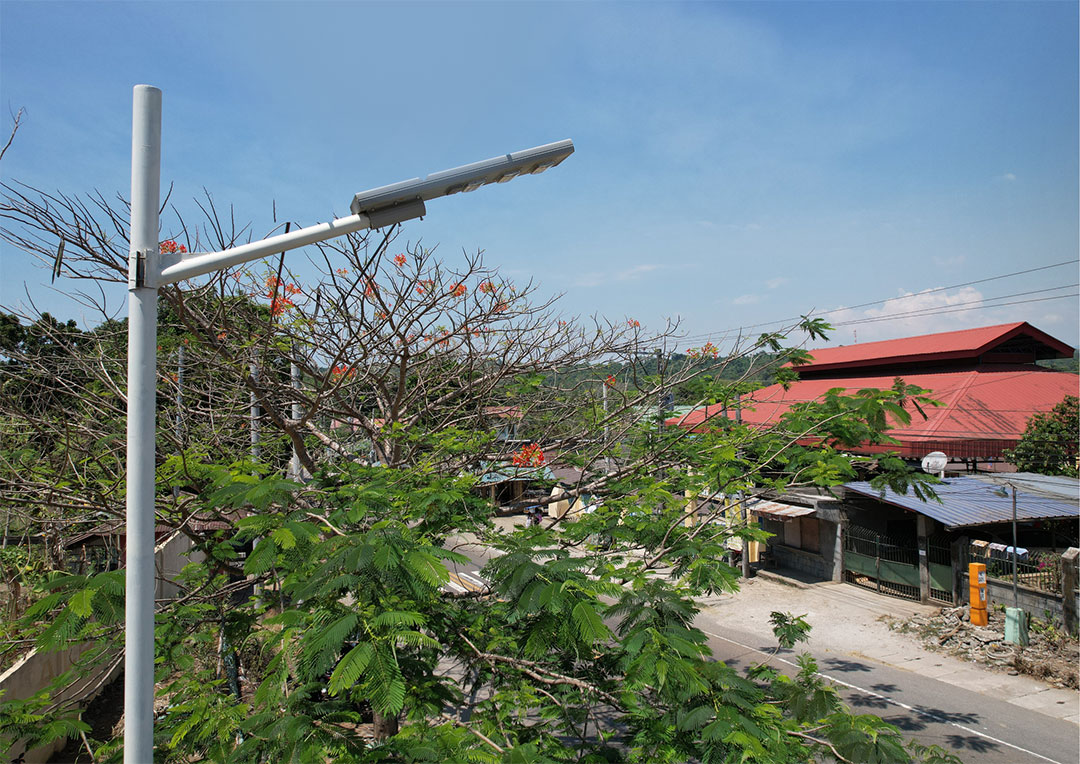 In the rural towns of Zambales, Philippines, solar-powered streetlights line the streets. Through our Renewable Energy Advocacy Program, the lights that we have installed provide meaningful impact to the community — improving security and strengthening community ties.
In the rural towns of Zambales, Philippines, solar-powered streetlights line the streets. Through our Renewable Energy Advocacy Program, the lights that we have installed provide meaningful impact to the community — improving security and strengthening community ties.We strive to empower our host communities by creating different initiatives to support local livelihoods in our areas of operation. In 2022, we solidified our social performance by creating and supporting over 30 livelihood programs focused on skills enhancement, provision of equipment, materials and capital, creation of green jobs and promotion of local tourism.
In San Lorenzo, Guimaras, where we operate a 54 MW wind farm, we continue to support the local salt-making industry by partnering with the Department of Science and Technology (DOST) to train 11 salt-makers in commercial packaging and labeling and provide access to equipment that can be used to assist in their enterprise. Guimaras Wind also continues to boost local tourism and livelihood as it recorded a spike in the number of tourists as quarantine restrictions eased. With close to 35,000 visitors recorded in 2022, the Provincial Tourism Office of Guimaras recognized ACEN’s Guimaras Wind as the top tourist destination in the province, besting nine other tourist attractions – which in the long run has improved the locals’ livelihood.
In Indonesia, our Sidrap Wind Farm has recently finished Phase 1 of its Tourism Center which aims to promote a new iconic destination, providing an opportunity to integrate economic, environmental and cultural sustainability that will be packaged with other tourism destinations in Sidrap Regency and South Sulawesi province.
Meanwhile, the continuous partnership of ACEN’s Ilocos wind farms with Ensha Wellness in empowering women made it possible to conduct skills training and provide massage kits to 25 women in Pagudpud. These women were trained to do a traditional massage called “hilot-hilom”, locally known as “ablon”.
Our Ilocos wind farms, North Luzon Renewables and Pagudpud Wind, also continue to support the livelihood of four local indigenous tribes by funding over ₱10 million to purchase farm equipment, tools and supplies for agroforestry development
The growing efforts of ACEN in conducting upland reforestation and coastal rehabilitation activities also provided livelihood for its host communities across its wind, solar and coal assets. ACEN’s Guimaras Wind, MonteSol, Alaminos Solar, and Subic Thermal adopted mangrove and upland reforestation sites to support local environmental conservation efforts and creation of green jobs through nursery establishment, seedling production, site preparation, and maintenance and monitoring.
In Laguna, Alaminos Solar takes advantage of the lush biodiversity from the carbon forest surrounding its plant by partnering with a local farmers group, Pangkat Ugnayan ng Nagkakaisang Lakas ng Alaminos (PUNLA), to collect tree saplings that grow under the photovoltaic panels.
Over 17,000 saplings of 14 native pioneering tree species were collected and transferred to the nearby tree nursery. The said saplings with an estimated worth of ~₱200,0001 will help support the reforestation efforts of the carbon forest.
ACEN’s wind farm in Dai Phong, Vietnam also provided livelihood to nine households directly affected by our operations through pig and cow raising and chicken farming. In Hong Phong, our women empowerment program identified a women’s union with 40 members to jumpstart their livelihood through poultry and pig raising.
Rice and coffee agrotourism have also provided a significant 30% increase in the annual income of the Purwabati community surrounding our Salak and Darajat Geothermal facility in Indonesia, where we invested ~₱1.5 million for the plant’s agrotourism efforts.
As we strengthen our efforts to protect the environment, we also make sure that we drive a positive impact on the lives of the people in our host communities. In 2022, we invested ~₱8 million to promote sustainable livelihoods to support 350 families through collaborations with local and indigenous people’s organizations. Our investments vary from nursery and community backyard seedling production, tree planting and nourishing, monitoring, and maintenance.
In Ilocos Norte, we maintain a 4.5-hectare agroforestry model farm within our 700-hectare Conservation Estate, an excellent model for environmental management and social programs through agricultural innovation and practices and creation of more green jobs. In 2022, we planted a total of ~6, 650 fruit trees and 13 food crops and harvested 4,400 kg of fruits and vegetables. Tree and crop seedlings were distributed to 30 farming families to develop their respective farm plots within the Conservation Estate. Over 100 farmers also benefited from capacity-building activities related to agroforestry development conducted by in-house foresters and forestry experts. From 2014 to 2022, we already planted approximately 500,000 endemic and fruit-bearing seedlings in various locations using analogue forestry through our community-based reforestation initiatives.
We will continue to sustain green initiatives within the Conservation Estate and forge meaningful partnerships with local and business organizations as we ramp up our reforestation and agriculture efforts, for the benefit of the larger community where we operate.
Learn more about our flagship sustainability program,
the Conservation Estate in Ilocos Norte.
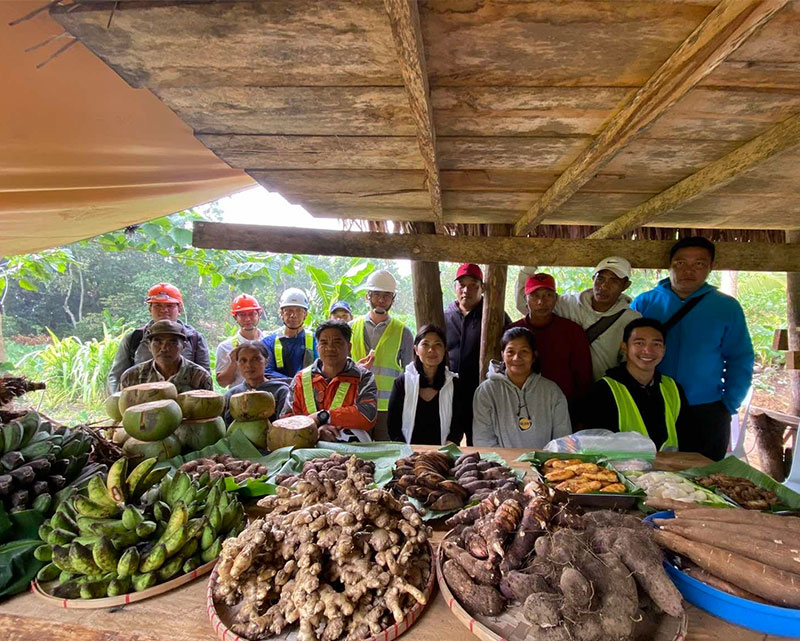
ACEN’s solar farms in the Philippines have piloted an innovative, collaborative and interdisciplinary program which aims to support the energy transition while helping provide food security and livelihood opportunities to local communities. Through its agrivoltaics-based program, “Solar Gulayan”, five of our solar farms across the country have already harvested more than 1,700 kilos of crops since the pilot farming system started early last year. As the solar farms generate an aggregate renewables capacity of 326 MW, the program ensures that available land within the solar plants is optimized for agriculture and food production.
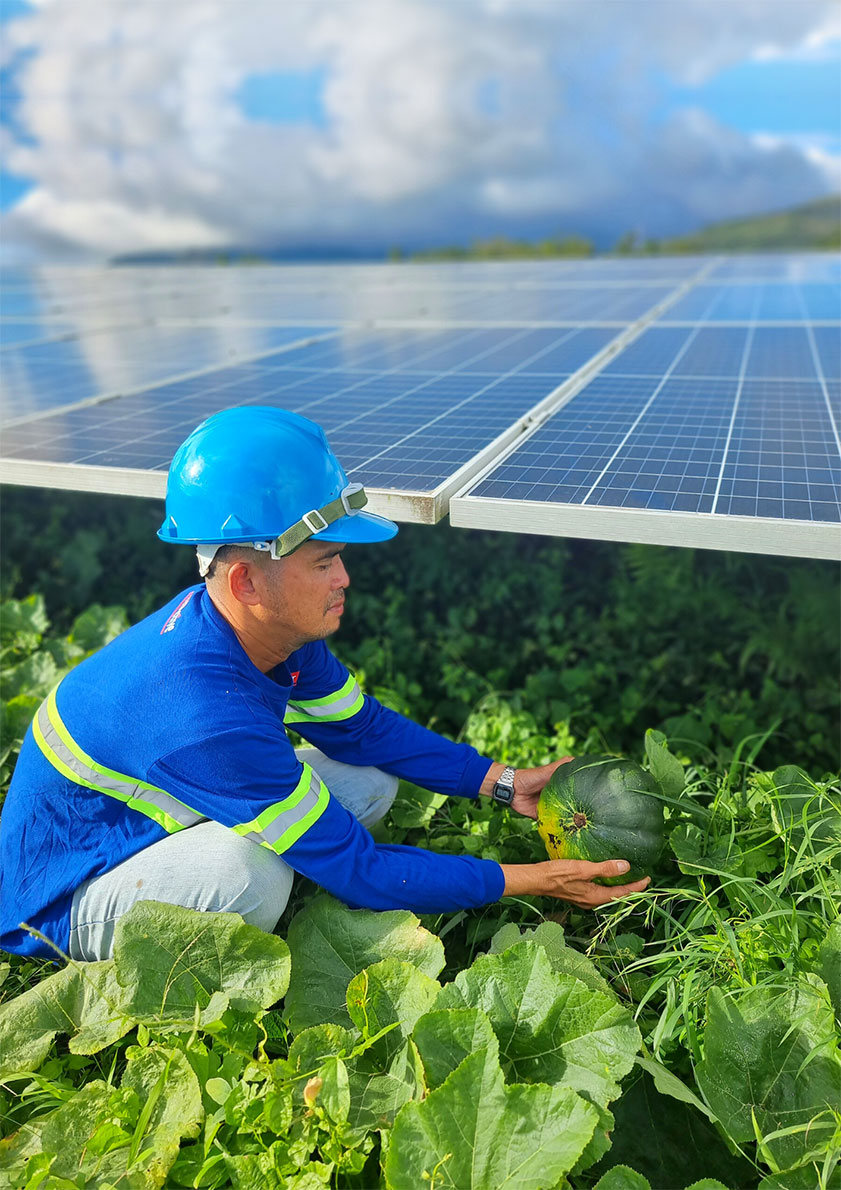
Co-locating solar panels and crops
Agrivoltaics is the simultaneous use of land to generate solar energy and produce agricultural products, addressing the dual need to transition to clean energy and increase food supply. In this symbiotic farming system, the plants help keep the solar panels cool, making them more productive by generating up to 10% more electricity, and allowing for more solar energy to be harnessed.
The planted crops, on the other hand, thrive in the additional shade that the solar panels provide. Since the crops are in a more protected environment, they become less stressed and yield more harvest. With the shelter that the panels provide, the plants require less water, thereby reducing its overall consumption.
Our solar plants – Alaminos Solar in Laguna, Palauig Solar in Zambales and IslaSol, MonteSol and SacaSol in Negros – have since enjoyed plentiful harvests since the program rolled out last year. The harvested crops include pechay, radish, bell pepper, eggplant, okra, sweet potato, banana, bottle gourd, peanut, papaya, taro, tomato, alugbati, mustard, Chinese cabbage, tiger baby melon, squash, ampalaya, turmeric, mung bean, longyard beans, pineapple, lemon, lime, calamansi and more.
Impacting farmers through supply chain collaboration
Apart from offering improved efficiency on the solar farm’s output, food production and plant stress, the program also serves another important aspect of the community – stirring the economy through livelihood.
Our solar plants have identified local farming organizations from their respective host communities to partner with and enhance the food supply chain, namely: Alaminos Laguna Consumers Cooperative (ALACCO) for Alaminos Solar and Zambales Millennial Farmers and Producers Association for Palauig Solar.
Through these partnerships, our Solar Gulayan program helps champion the communities as main stakeholders, as the company targets to scale up and replicate the project in its future solar projects across the Philippines.
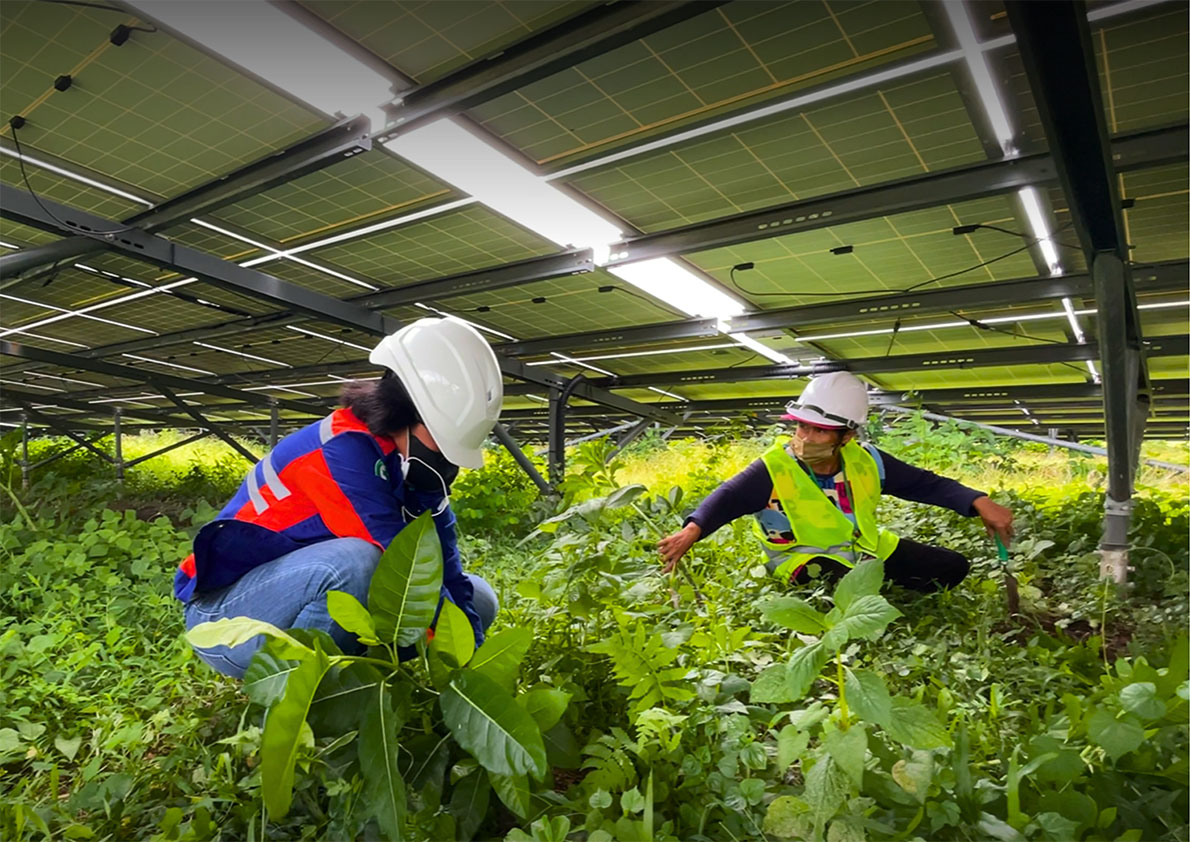 Plants thrive underneath the solar panels at ACEN’s Alaminos Solar in Laguna in an effort to harness renewable energy and increase food supply at the same time.
Plants thrive underneath the solar panels at ACEN’s Alaminos Solar in Laguna in an effort to harness renewable energy and increase food supply at the same time.Addressing both energy and agriculture
By allowing the use of solar farm land, our agrivoltaics program helps address two of the most pressing concerns in the modern society – the transition to renewable energy and improving our local food security.
The integration of agriculture in our solar plant operations provides mutual benefits on the energy and food industry in the community, creating a massive opportunity to accelerate both the clean energy transition and the transformation of our food supply chain. It’s a win-win approach to achieve a sustainable future for all.
Read more about how solar energy co-exists with
agriculture through our agrivoltaics program
In 2022, we scaled up our circularity approach by inaugurating the first Community Eco Hub in the municipality of Piddig in Ilocos Norte, where we have driven awareness and action on plastic waste management to the community such as schools and even commercial establishments.
Plastic waste collected from schools and various business establishments are donated to the facility so they can be converted into eco-products. Eco-products have been used in the construction of our 160 MW Pagudpud Wind, a proactive effort to close the loop in the supply chain.
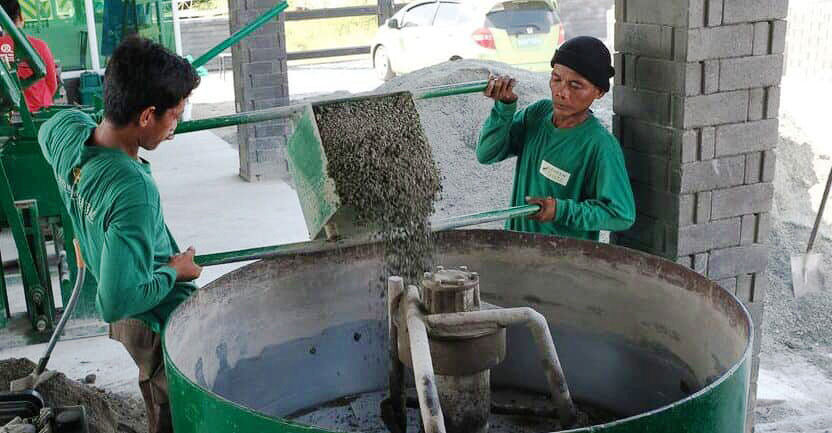
Since its inauguration in May 2022, the Community Eco Hub, a collaboration with Green Antz and the Provincial Government of Ilocos Norte (PGIN), successfully diverted ~3,600 kg of plastic waste from landfills and manufactured ~64,000 ecoproducts. We integrate this circular approach into our renewable energy developments by using these eco-products in the construction of some facilities within our 160 MW Pagudpud Wind, slated to be the largest wind farm in the Philippines. Some schools in Ilocos Norte have also begun integrating these eco-products in building new infrastructure, like Luzong Elementary School, which was also selected to become the Eco Hub‘s first plastic drop-off and redemption center in Ilocos Norte.
The Community Eco Hub has driven awareness on plastic waste management to the community, such as schools and nearby commercial establishments like coffee shops and resorts, which now practice this circularity framework by donating their plastic waste such as cups, straws, lids, bottles and cutleries to the facility. We are expecting to expand our waste diversion efforts in 2023 through plastic waste diversion agreements with nearby communities.
These efforts of upholding environmentally responsible business practices were recognized by the provincial government during its Ilocos Norte Business Forum in July 2022. With the growing support of the community stakeholders, Ilocos Norte Eco Hub is set to execute more projects supporting education and tourism in the following year.
The concept of the Ilocos Norte Community Eco Hub draws inspiration from the successful integration of the circularity framework in our 120 MW Alaminos Solar farm in Laguna.
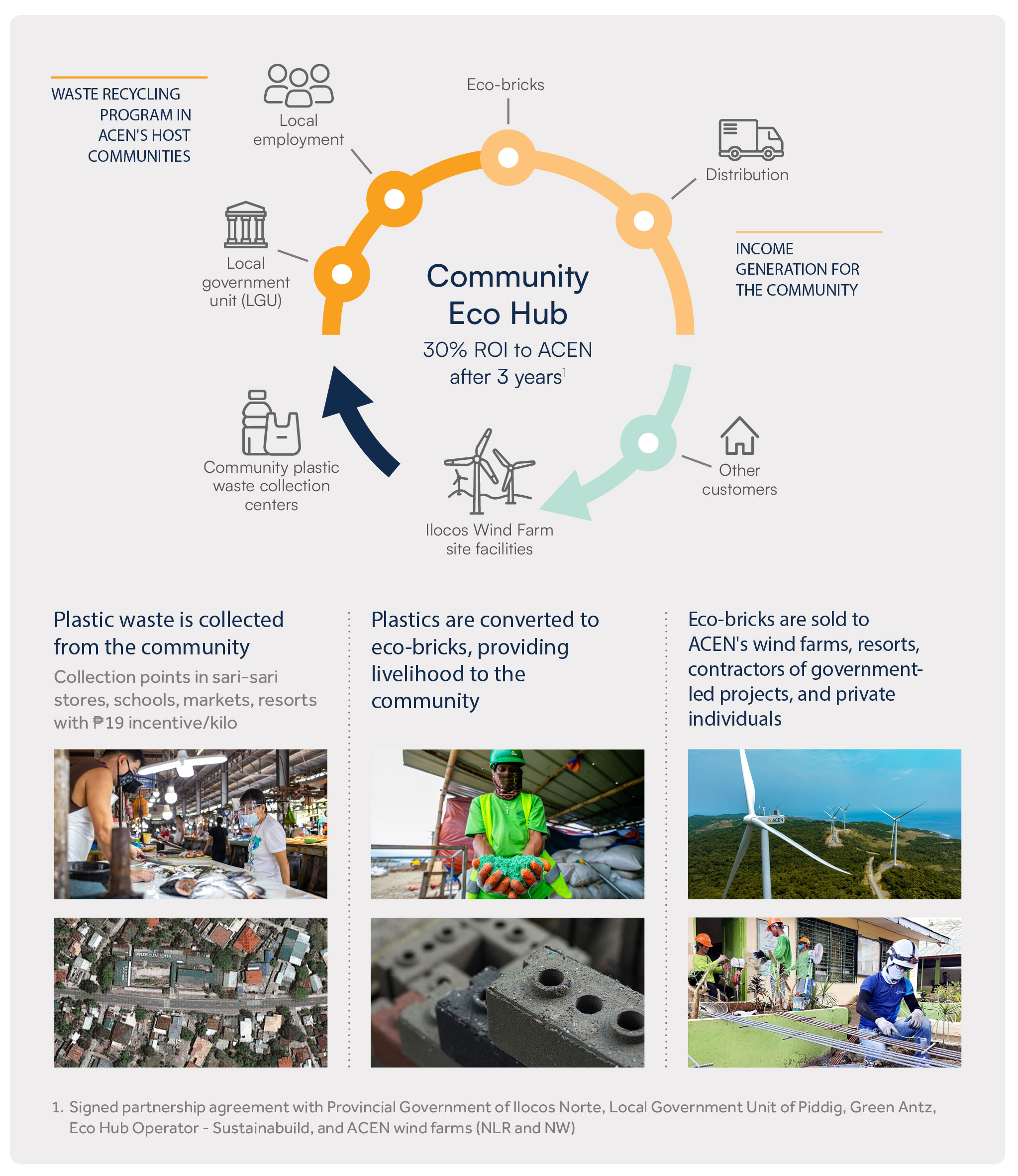
As full-time, face-to-face classes resumed in 2022 after COVID-19 pandemic restrictions eased in the Philippines, ACEN remained to be a pillar of the education sector in supporting the plight of students and teachers in our host communities.
Over ₱20 million was spent on projects to support education in our host communities to construct and repair schools, fund scholarships for local communities and IP groups present in our communities, trainings for teachers and students, and provision of learning equipment and school supplies, benefitting 12 communities, 330 schools, seven local government organizations and four indigenous groups.
In Palauig, Zambales, in partnership with the local government, we donated ~₱15 million for the construction of Rofulo M. Landa High School’s campus extension in Brgy. Bulawen, where we built six classrooms aimed to decongest student population in the school’s main campus in Brgy. Salaza.
Over ₱3 million was also provided to support the Department of Education (DepEd)’s Brigada and Balik Eskwela, aligning with Brigadang Ayala’s initiatives to over 200 schools. We also donated heavy-duty printers, school supplies, healthcare kits, and even construction materials to schools within our local communities across Luzon and Visayas.
In Ilocos Norte, our North Luzon Renewables (NLR) team has been working with the academe since 2017 through its Learning Lab Project, a capacity building project where select teachers are invited to visit the NLR facility to learn about environmental themes such as climate change, sustainability and biodiversity. The teachers then create learning modules on environmental awareness that they can share with their students. In 2022, NLR, together with the DepEd Schools Division of Ilocos Norte, conducted demonstrations and training sessions to select teachers in Pagudpud to assess the needed improvements in their existing modules.
Meanwhile, we invested over ₱360,000 in educational programs and assistance to support various local communities in Vietnam. In Khan Hoa and Dak Lak, where we operate an 80 MW solar farm, we provided school bags and notebooks to students from marginalized families in two communities. We also continue to support the literacy of students from rural communities near our Salak and Darajat Geothermal in Indonesia through the development of the Taman Pamekar Library, where we provided over ₱340,000 in cash assistance.
The same concept applies to ACEN Australia’s scholarship assistance, where we funded the education of our chosen beneficiary, Kinae Edwards from Hellyer College, who has her sights set on to become part of Tasmania and Australia’s growing renewable energy sector.
Locally, we also help grant and maintain scholarships for the students of Mano Amiga, a non-profit organization aimed at providing scholarships and sustainable livelihood to low income families. ACEN group employees donated ₱700,000 in out-of-pocket contributions in 2022 on top of the ₱120,000 funding from several of ACEN’s Philippine plants.
At the plant level, we sustained our educational support to existing scholarships and provide new ones. Since 2014, NorthWind and NLR have supported the education of 18 college students from their host communities, two of which belong to the indigenous Yapayao tribes in Pagudpud. Arayat-Mexico Solar, through its Usbong Scholarship project, supports a total of nine students.
We also empower our communities to be prepared in the event of an emergency to minimize casualties and injuries.
In Ilocos Norte, NLR and NorthWind collaborated with the local Bureau of Fire Protection and DepEd to train teachers about basic first aid skills and techniques that they can apply in times of disasters and accidents. Fifty teachers were trained and equipped as their schools’ respective Disaster Risk and Reduction Management (DRRM) coordinators from various municipalities participated in the training. NLR and NorthWind also provided first aid kits, hard hats, reflectorized vests, face masks and t-shirts to the participants, and donated hygiene kits to students from six different schools.
In 2022, ACEN continued to extend assistance to healthcare centers, schools, barangays, and LGUs of the different host communities that we serve, investing over ~₱2 million in pandemic response initiatives. Collectively, these efforts have benefitted 800 families 16 communities, 10 local government organizations, two hospitals, and 20 schools.
Aside from our various health caravans and donations, we also launched our first synergy with Generika and nine other stakeholder groups in Negros Oriental.
We are bolstering our synergy with our communities through different activities aimed at scaling up our collective environmental action targets and promoting the people’s well-being.
Over ₱1 million was allotted by our plants – IslaSol, Alaminos Solar, SLTEC, NorthWind, Guimaras Wind, Palauig 1 Solar, Bulacan Thermal, Subic Thermal, La Union Thermal, Ingrid Thermal, Maibarara Geothermal, MonteSol and SacaSol – to support several global sustainability awareness days focused on environmental conservation.
These include National Environment Month, World Water Day, World Forest Day, International Mountain Day, and International Coastal Clean-up, wherein our plants organized and participated in regular tree-planting (upland, river and coastal) and clean-up activities in their respective communities.
ACEN’s contribution to sports and culture has also proven to be valuable to its communities, providing over ₱1 million in in-kind and cash donations.
NLR’s annual Run with the Wind has now become an Ilocos Norte staple sports event, attracting hundreds of runners from different provinces such as Cagayan, Apayao, Isabela, Ilocos Sur, La Union, Benguet and NCR since 2018. In Negros Occidental, SacaSol sponsored a sports tournament to promote camaraderie and sportsmanship for Negrense children who love to play tennis, badminton and football.
We also sponsored several activities during annual festivals of the localities where we operate in the form of food pack donations, cash prizes and tokens. In Vietnam, Dai Phong wind farm shared gifts to local government agencies in the Nghiep community in Phan Thien City during the Lunar New Year, while we also distributed moon cakes to 550 children from the Hong Phong community during their Mid-Autumn Festival.
In Australia, the Uralla Grants program was set up to share the benefits of the New England Solar and battery project with the Uralla Shire, Dangarsleigh and Kellys Plains communities. We awarded a total of ₱5.5 million to over 40 local projects and events that support health, fitness, sporting services, agecare facilities, schools, indigenous and nonindigenous historical awareness, environmental education and community events.
